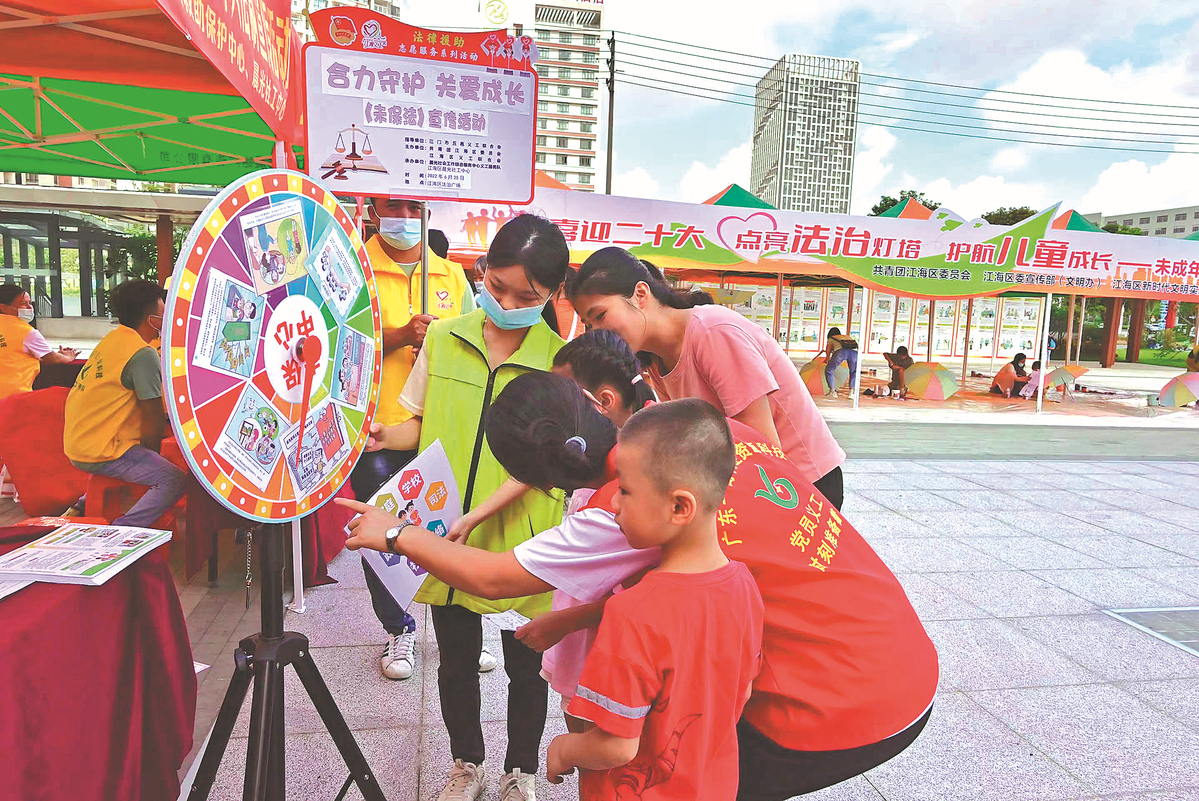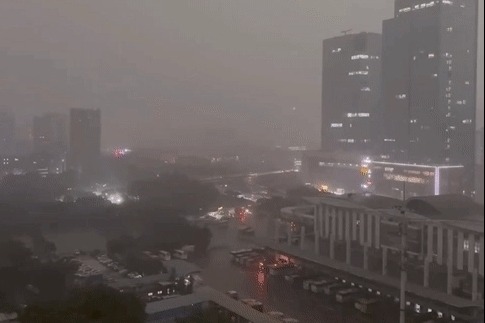Legislative input points for the public


Outreach offices provide means for grassroots participation in nation's legislature
Local legislative outreach offices provide shining examples of the "whole-process people's democracy" advocated in China. GDToday shares the practice of the mechanism in Guangdong and some other regions in China in the following story. The Chinese version was initially published in Southern Weekly.
"Now we can discuss national affairs on our doorstep," said villagers in Guandong village, Sanjiang Dong autonomous county, Liuzhou city, Guangxi Zhuang autonomous region, 1,675 kilometers away from the Great Hall of the People in Beijing. When they talk about national affairs, they mean participating in legislation.
As a local legislative outreach office, or LLOO, the Sanjiang county people's congress standing committee has identified 13 units, including Guandong village, as legislative information collection points.
Villagers' suggestions can be conveyed to the Standing Committee of the National People's Congress through a direct submission mechanism.
The establishment of LLOOs is a requirement put forward by the fourth plenary session of the 18th Central Committee of the Communist Party of China. In October 2014, the Decision of the CPC Central Committee on Major Issues Pertaining to Comprehensively Promoting the Rule of Law proposed: "Improve the mechanism for soliciting legislative opinions from grassroots-level people's congresses and establish an LLOO system."
One year later, the Legal Affairs Committee of the NPC Standing Committee designated four units, including the Hongqiao subdistrict office of Changning district, Shanghai, and the standing committee of the people's congress of Lintao county, Gansu province, as the first batch of pilot LLOOs.
In November 2019, the top Chinese leader proposed for the first time that "people's democracy is a whole-process people's democracy" when inspecting the LLOO in the Hongqiao subdistrict, Shanghai.
In 2020, Sanjiang county was identified as part of the second batch of LLOOs of the Legal Affairs Committee of the Standing Committee of the NPC. It is also the only ethnic autonomous county with national-level LLOOs.
2024 is the 10th year since the establishment of the first batch of national-level LLOOs. The number of national LLOOs has increased to 45, covering 31 provinces, municipalities and autonomous regions across the country.
These LLOOs provide a wealth of input to the nation's top legislative body. The latest statistics show that since March 2023, the NPC Standing Committee has solicited 9,394 suggestions and opinions from the public through the LLOOs on 27 draft laws and draft legislative plans.
In an interview with Southern Weekly in February 2023, Sun Zhenping, then director of the Legal Affairs Committee Office of the NPC Standing Committee, who is currently deputy director of the Legal Affairs Committee of the NPC Standing Committee, said the area covered by LLOOs has shifted from the initial southeastern coastal areas, economically developed areas, and urban areas to border areas, northeastern regions and rural areas, and the involved population is also gradually increasing.
"This promotes people's participation in the country's legislation and is a vivid practice of whole-process people's democracy," he said.
Persistent efforts
How to explain the role of an LLOO? In July 2015, the Hongqiao subdistrict office in Changning district, Shanghai, became one of the first batch of LLOOs, and soon encountered its first difficulty.
"If you don't know how the contact point works, you won't be able to give suggestions at all," said Liang Yingyan, an official of the Hongqiao subdistrict working committee of the Changning district people's congress.
Before soliciting legislative opinions, the Hongqiao subdistrict office visited local communities and solicited public opinion on how to introduce an LLOO.
A resident drew a cartoon, which was posted on the wall of the LLOO exhibition hall. The picture shows that on one side is the subdistrict's landmark broadcasting building, and on the other side is the Great Hall of the People, connecting with a rainbow bridge on which a pigeon holds a letter in its beak.
"The opinions and suggestions of residents on legislation can be directly submitted to the top legislature through the LLOO," Liang said on March 4, one day prior to the opening of the ongoing second session of the 14th NPC in Beijing.
After being recruited as one of the first batch of information officers, Wu Xinhui, director of Shanghai Kangming Law Firm, shared her experience of this system.
In September 2015, the LLOO of Hongqiao subdistrict received a notice from the NPC for the first time, soliciting opinions on the Anti-Domestic Violence Law (Draft). At that time, Wu was representing a case in which a paralyzed old man in his 90s was beaten by his daughter.
Based on this, Wu proposed that the elderly also be included in the protection targets of the Anti-Domestic Violence Law, and suggested adding legal provisions to protect the elderly from domestic violence. After the law was officially promulgated, she found this suggestion was adopted and included in the law.
The legislature also has other ways of soliciting opinions.
Feng Yujun, executive vice-president of the Association of Legislation of the China Law Society and a professor at the Law School of Renmin University of China, told reporters that when making legislation, the authorities will solicit opinions from all levels on "whether a certain law should be enacted, how it should be enacted, and when it should be promulgated".
However, according to Qiu Yangjun, deputy director of the standing committee of the Sanjiang county people's congress, some government departments have a lot of daily work, and they are worried about troubles "if they say something bad", so they will say they have "no opinions", while residents with no government positions can give their opinions bluntly.
But getting public opinions even after establishing LLOOs isn't accomplished overnight.























